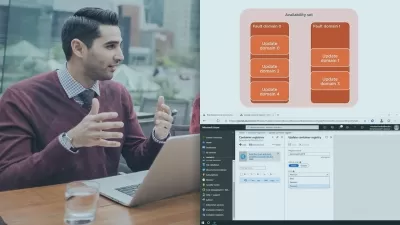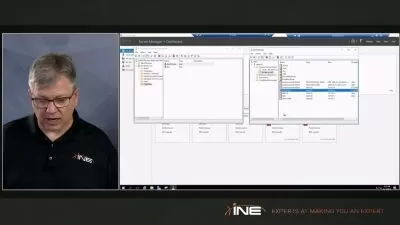Azure Kusto Query Language KQL for Log analytics and Fabric
1:02:30
Description
Azure Kusto Query Language | KQL | Databricks Accounts, workspace, Notebook, job, spark logs
What You'll Learn?
- Azure Kusto Query Language KQL
- Azure Log Analytics
- Azure Workbook
- Microsoft Azure Fabric KQL
Who is this for?
What You Need to Know?
More details
DescriptionAfter completion of this you would be writing Azure Kusto Query Language KQL comfortably using the Azure Log analytics and implement the Log Analytics workbook with metrics related to the import azure service logs from Databricks, spark, Azure logs.
Kusto Query Language (KQL) is a powerful tool to explore your data and discover patterns, identify anomalies and outliers, create statistical modeling, and more. KQL is a simple yet powerful language to query structured, semi-structured, and unstructured data. The language is expressive, easy to read and understand the query intent, and optimized for authoring experiences. Kusto Query Language is optimal for querying telemetry, metrics, and logs with deep support for text search and parsing, time-series operators and functions, analytics and aggregation, geospatial, vector similarity searches, and many other language constructs that provide the most optimal language for data analysis. The query uses schema entities that are organized in a hierarchy similar to SQLs: databases, tables, and columns.
KQL (Kusto Query Language) was developed with certain key principals in mind, like – easy to read and understand syntax, provide high-performance through scaling, and the one that can transition smoothly from simple to complex query.
Interestingly KQL is a read-only query language, which processes the data and returns results. It is very similar to SQL with a sequence of statements, where the statements are modeled as a flow of tabular data output from the previous statement to the next statement. These statements are concatenated with a pipe (|) character.
In SQL, the queries start with the column names and we only get to know about the table name when we reach the “From†statement, whereas, in KQL, the query starts with the table name followed by the pipe character after which the conditions are defined. We will see how this works shortly.
Who this course is for:
- Any Data engineer/Analyst who is working on Azure services for building Kusto Query language KQL queries
- Who want to create a unified Azure workbook dashboard with azure service logs using the Kusto Query language KQL
After completion of this you would be writing Azure Kusto Query Language KQL comfortably using the Azure Log analytics and implement the Log Analytics workbook with metrics related to the import azure service logs from Databricks, spark, Azure logs.
Kusto Query Language (KQL) is a powerful tool to explore your data and discover patterns, identify anomalies and outliers, create statistical modeling, and more. KQL is a simple yet powerful language to query structured, semi-structured, and unstructured data. The language is expressive, easy to read and understand the query intent, and optimized for authoring experiences. Kusto Query Language is optimal for querying telemetry, metrics, and logs with deep support for text search and parsing, time-series operators and functions, analytics and aggregation, geospatial, vector similarity searches, and many other language constructs that provide the most optimal language for data analysis. The query uses schema entities that are organized in a hierarchy similar to SQLs: databases, tables, and columns.
KQL (Kusto Query Language) was developed with certain key principals in mind, like – easy to read and understand syntax, provide high-performance through scaling, and the one that can transition smoothly from simple to complex query.
Interestingly KQL is a read-only query language, which processes the data and returns results. It is very similar to SQL with a sequence of statements, where the statements are modeled as a flow of tabular data output from the previous statement to the next statement. These statements are concatenated with a pipe (|) character.
In SQL, the queries start with the column names and we only get to know about the table name when we reach the “From†statement, whereas, in KQL, the query starts with the table name followed by the pipe character after which the conditions are defined. We will see how this works shortly.
Who this course is for:
- Any Data engineer/Analyst who is working on Azure services for building Kusto Query language KQL queries
- Who want to create a unified Azure workbook dashboard with azure service logs using the Kusto Query language KQL
User Reviews
Rating

Udemy
View courses Udemy- language english
- Training sessions 12
- duration 1:02:30
- Release Date 2025/03/08









